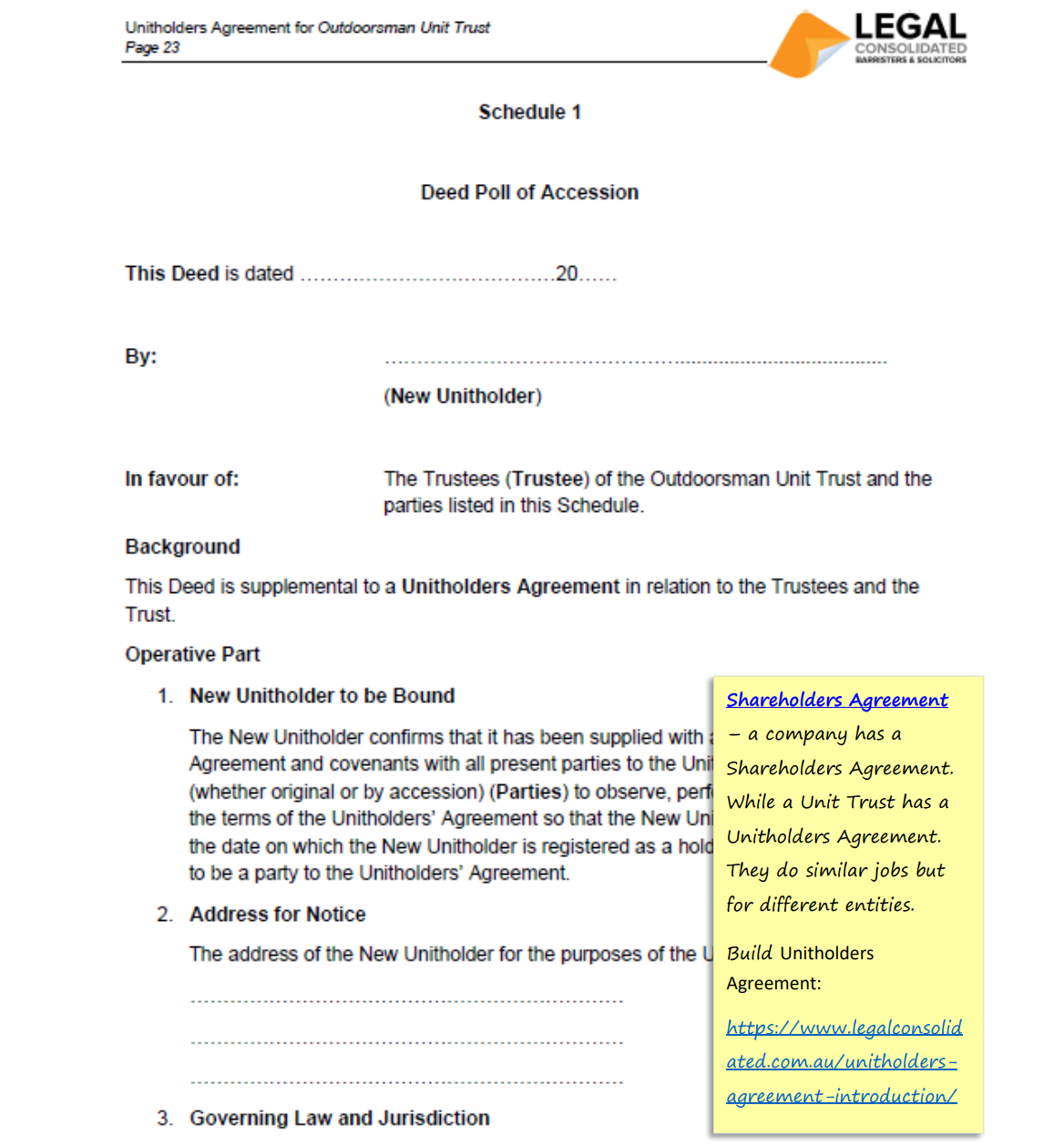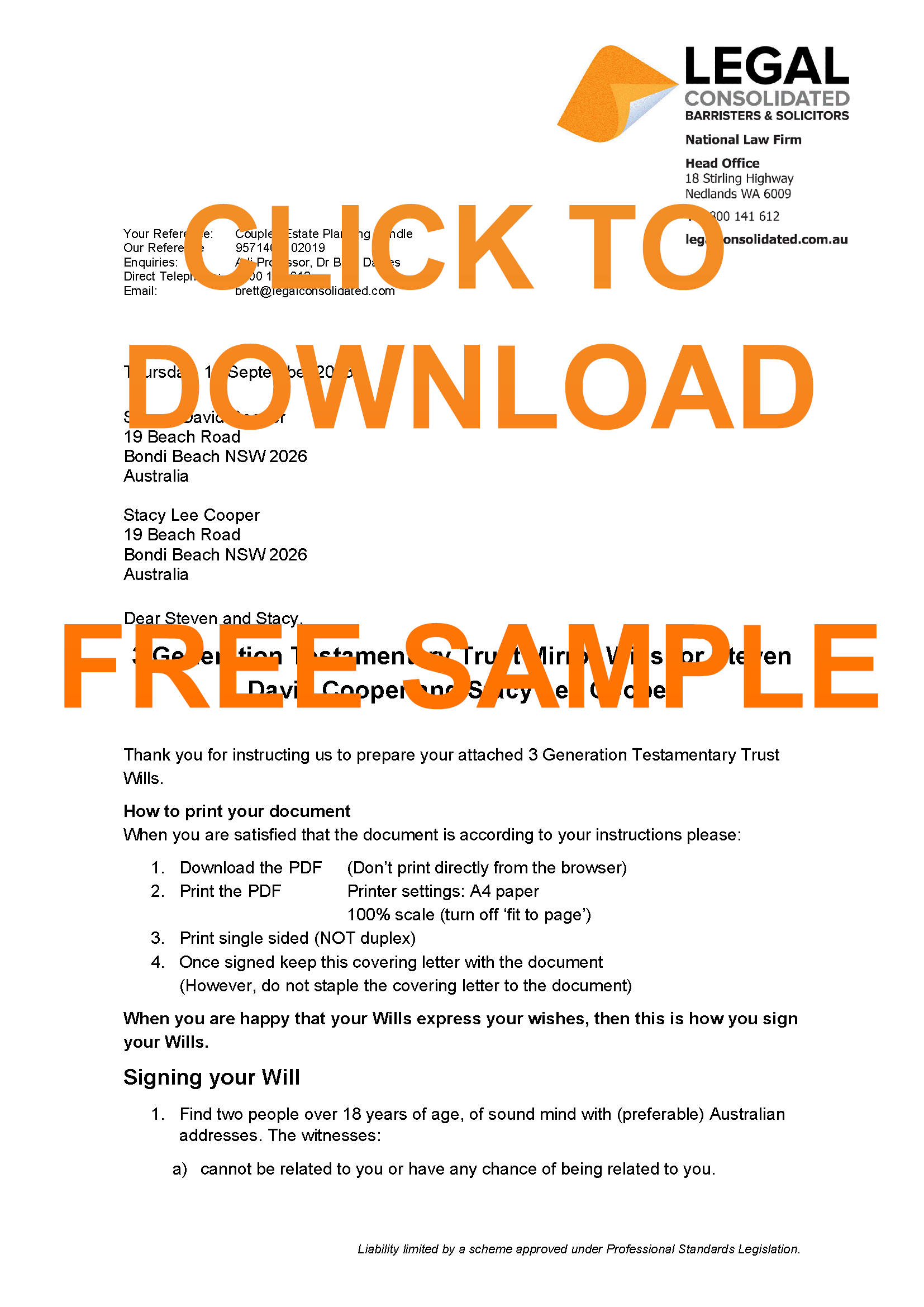How to build a Unitholder Agreement on a law firm’s website?
A Unitholders Agreement is an agreement. It is between the unitholders and the Unit Trust trustee. It overrides a Unit Trust Deed. It sets out how the unit trust is managed. It addresses issues not covered in a Unit Trust Deed.
A Unitholders Agreement is similar to a Shareholders Agreement.
Unitholders’ Agreements manage the behaviour of unitholders in a unit trust.
Unitholders’ Agreements are cost-effective. They allow:
- future changes via an exchange of emails and minutes
- alternative dispute resolution if the Unitholders disagree
- the issuing, valuation, and transfer of units in a unit trust
- unitholder insurance – trauma, TPD, life, and income protection
Unitholder agreements outline each unitholder’s rights and obligations to one another.
What if the Unitholders fight?
What if there is conflict? Dispute resolution clauses manage conflict. This is outside the court system. The Unitholders reach a cost-effective solution. As the rights and behaviour of unitholders are managed by the Unit Holders Agreement, the opportunity for conflict is reduced.
Unit Holders’ Agreements are supplemental to unit trust deeds. Build both Unit Trust Deeds and Unit Holders’ Agreements on our website.
See the full free sample of an Australian Unit Holders Agreement
As with all Legal Consolidated documents, you can see a full copy and covering letter of the Unitholders Agreement document. Just press the “Sample” button above.
A Unit Holders Agreement stops fighting
“Bob co-owns a $500,000 boat with two of his closest business partners – Ben and Jerry. He is unrelated to his partners and only engages them in joint business ventures. Bob, Ben, and Jerry come to an arrangement. The boat is managed through a Unit Trust. Everyone contributed different amounts and the market value of the boat is forever fluctuating. All three partners are made Unitholders to the Trust. Bob does not seek any legal or financial advice. A Unitholders Agreement is never signed between the three business partners.
One day, a dispute arose as to the valuation of units Bob and his partners own through the Unit Trust. The unit trust does not contain procedures for valuing units, nor dispute resolution clauses. Because Bob and his business partners did not seek advice nor sign a Unitholders Agreement, their only solution is pursuing time-consuming and costly litigation.”
The Unitholders Agreement saves unitholders, such as Bob, from the headache of litigating disputes.
Can I get a Unitholders Agreement 20 years after we started the Unit Trust?

Yes. You build and sign a Unitholder Agreement many years after you started your Unit Trust.
How do I update the Unitholders Agreement?
Over the life of the Unit Trust, the Unitholders will likely want to change or amend the rights between them. The Unitholder Agreement expressly allows you to make changes merely by:
- an exchange of emails
- Minutes
This is provided the Unitholders unanimously agree.
Why can’t I put more information into the Unitholders Agreement?
We have been providing Unitholder Agreements since 1988. We put into the Unitholders Agreement what is required. You amend the Unitholders Agreement, from time to time, by an exchange of emails or minutes. You may have additional items that you would like to be addressed. For example:
I am lending money to the Unit Trust. I want that in the Unitholders Agreement
Loan Agreements do not belong in Unitholders Agreements. Instead, build this Loan Agreement. It allows for security such as mortgages, caveats, and PPSR. It also allows for guarantors.
One of the Unitholders’ children will be working in the business
Do not put employment contracts in a Unitholders Agreement. Instead, build a standalone Employment Contract.
My other business is providing services to the Unit Trust
Do not put contractual relationships with related parties into the Unitholders Agreement. Instead, build a standalone Independent Contractor Agreement.
My Unit Trust is providing services to a related business. How do I include that in the Unitholders Agreement? The Unit Trust is a ‘service trust’.
Do not put service trusts and service trust agreements into a Unit Holders agreement. Instead, build a separate service trust agreement:
- Service Trust Agreement
- Doctor’s Service Trust Agreement
- Law firm Service Trust Agreement
- Accounting House Service Trust Agreement
- Engineering Company Service Trust Agreement
- Dental Practice Service Trust Agreement
Can I amend the Unitholder Agreement via minutes or an exchange of email?
Q: There is no area where any request is made for information for particular matters agreed between the parties. Do we simply amend the deed by minutes?
A: That is correct. Throughout the life of the Unit Trust, the Unitholders Agreement is amended by minutes. Or it is amended by an exchange of emails.
Does a Unitholders Agreement deal with investments?
No, they do not.
Unitholders debating on what the Unit Trust will do and invest in is not a matter of the Unit Trust deed or a Unitholders Agreement. This is similar to a company and shareholder agreement. When shareholders debate how to run the business, they typically do not update the company’s Constitution or the Shareholders’ Agreement.
But again, as said above, once you build the Unitholders Agreement, you can agree on investments by an exchange of emails or minutes.
Update the Unit Trust Deed, as well.
Family Trust deeds and Self-Managed Superannuation fund deeds need updating every 5 – 8 years. This is to deal with tax and trust matters. However, Unit Trust Deeds don’t usually need updating. But of course, you can update a Unit Trust as often as you wish if all the unitholders agree.
Must a Unit Holders Agreement be signed as a Deed?
In El-Cheikh v Miraki [2021] NSWCA 271, a unitholders agreement is signed by all parties.
But the document is signed as an ‘agreement’. It was not signed as a ‘deed’. The Unit Trust is riddled with faults, and a Unit Holders Agreement can help fix those faults. However, because the document is signed as an agreement, there is no protection of estoppel by deed.
The court noted that the unitholders agreement is an “ill-fitting adaption of a precedent intended to do something else, probably a shareholders’ agreement”. For example, the document:
- had a heading for certain clauses of “management of the company” when there was no definition of “company”;
- set out a definition of the individual as the trustee, despite the balance of the document contemplating a corporate trustee; and
- was lodged for stamping at the Office of State Revenue despite it not being liable for duty (unlike the trust deed).
Mum and Dad trying to build their documents is fraught with danger.
Deed of Accession: binds new Unitholders to the Unit Holders Agreement
The Deed of Accession legally binds a new unitholder to a pre-existing Unit Holders Agreement. This ensures all parties operate under the same rules, maintaining the stability and integrity of the unit trust.
What is a Deed of Accession in a Unit Trust?
A Deed of Accession is a legal document signed by a person or entity becoming a new unitholder. By signing, they formally agree to be bound by the existing Unit Holders Agreement “as if the new unitholder was an original party to it.” This process effectively makes them a party to the original contract, granting them the rights and subjecting them to the obligations within it.
Why is a Deed of Accession Legally Necessary in Australia?
The legal necessity for this deed stems from a core principle of Australian contract law: privity of contract. This doctrine dictates that only the original parties who signed an agreement are bound by its terms. Therefore, without a formal mechanism such as a Deed of Accession, a new unitholder would not be legally bound by the crucial governance rules of the pre-existing Unit Holders Agreement.
The Legal Advantage of a “Deed” over an “Agreement”
A Legal Consolidated Deed of Accession is intentionally structured as a “deed” for a specific legal advantage in Australia. Unlike a simple agreement, a deed does not require “consideration” (the exchange of value) to be enforceable. Its legal power comes from the formal manner of its execution—being signed, witnessed, and delivered. This removes many potential legal challenges and provides greater certainty.
Legal Execution Requirements for a Deed in Australia
For a Deed of Accession to be valid in Australia, strict execution formalities must be met:
-
It must be written and clearly state that it is a deed.
-
It must be signed and witnessed.
-
It must be “delivered” (which signifies an intention to be legally bound).
-
If a company is signing (as a unitholder or trustee), execution must comply with the Corporations Act 2001 (Cth).
Benefits of an In-Built Deed of Accession
Including a Deed of Accession as a schedule within the main Unit Holders Agreement, as Legal Consolidated does, offers significant benefits:
-
Efficiency: It provides a streamlined, ready-to-use process for admitting new unitholders without the cost and delay of drafting a new agreement.
-
Legal Certainty: It creates a clear, legally robust, and enforceable method for binding all parties to the same terms.
-
Enforceability: Once executed, the new unitholder can enforce their rights against existing unitholders, and vice versa, ensuring consistent governance and dispute resolution.
In summary, the Deed of Accession is an essential legal instrument for any well-managed unit trust in Australia. Its inclusion simplifies administration while providing the robust legal framework needed to protect all unitholders.

To bind new unitholders to your existing agreement, Legal Consolidated’s Unit Holders Agreement includes a built-in Deed of Accession for seamless integration.
Unit Holders Agreement vs Shareholder Agreement
A Unitholders Agreement is a contract between the unitholders. It overrides a Trust Deed. It states how the Unit Trust is managed and how the Unitholders behave amongst themselves. (It is similar to a Shareholders Agreement.)
You need separate agreements for each of these:
- A Business Succession Plan is an agreement to get rid of the disabled or dead owner with some money. The outgoing owner gets some money and the remaining owners get his interest in the business. A BSP does nothing to help the business itself. The business may well fold after the person leaves, but at least his wife gets some money and the remaining owners get the business. A BSP is funded with life, TPD, and trauma insurance. Professor Davies’ doctoral thesis was on this topic.
- Key person insurance is a type of insurance that pays the business if a key person is disabled or dies. This does not address how to transfer the shares from the outgoing owner. Key person insurance just helps the business. Key person insurance is typically used to repay debt (often secured by the outgoing owners’ home) or cover the cost of training a replacement.
- Shareholders Agreement – a company has a Shareholders Agreement. While a Unit Trust has a Unit Holders Agreement. They do similar jobs but for different entities.
Our Unit Holders Agreement utilises the latest tax rules
Unit Trust |
|
| Unit Trust Deed – with both pre-emptive rights and Unitholder asset protection | |
| Vesting Deed – to wind up your Unit Trust | |
| Company to be trustee of a Unit Trust – corporate trustee for asset protection | |
| Update the Trustees of the Unit Trust – remove and replace the trustee of your Unit Trust |
Business Structures v Unitholders Agreements
Family trust
- Family Trust Deed – watch the free training course
- Family Trust Updates:
- Everything – Appointor, Trustee & Deed Update
- Deed ONLY – only update the Deed for tax
- Guardian and Appointor – only update the Guardian & Appointor
- Change the Trustee – change human Trustees and Company Trustees
- The company as Trustee of Family Trust – only for assets protection?
- Bucket Company for Family Trust – tax advantages of a corporate beneficiary
Unit trust
- Unit Trust
- Unit Trust Vesting Deed – wind up your Unit Trust
- Change Unit Trust Trustee – replace the trustee of your Unit Trust
- Company as Trustee of Unit Trust – how to build a company designed to be a trustee of a Unit Trust
Corporate structures
- Partnership Agreement – but what about joint liability?
- Incorporate an Australian Company – best practice with the Constitution
- Upgrade the old Company Constitution – this is why
- Replace lost Company Constitution – about to get an ATO Audit?
- Independent Contractor Agreement – make sure the person is NOT an employee
- Service Trust Agreement – operate a second business to move income and wealth
- Law firm Service Trust Agreement – how a law firm runs the backend of its practice
- Medical Doctor Service Trust Agreement – complies with all State rules, including New South Wales
- Dentist Service Trust Agreement – how dentists move income to their family
- Engineering Service Trust Agreement – commonly engineers set up the wrong structure
- Accountants Service Trust Agreement – complies with ATO’s new view on the Phillips case

